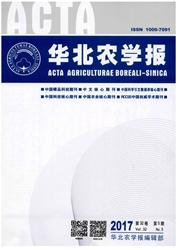

 中文摘要:
中文摘要:
以‘突尼斯软子’石榴的1年生休眠期扦插苗为材料,置于-6℃低温条件下,进行不同时间(0,6,12,18,24,30,36,42,48,54h)的低温胁迫处理,测定其根颈部的相对电导率、过氧化氢酶(CAT)、超氧化物歧化酶(SOD)、过氧化物酶(POD)等抗寒性相关指标,分析‘突尼斯软子’石榴1年生休眠期扦插苗木对低温的忍耐程度。结果表明,在0-30h低温胁迫时间内,相对电导率和MDA含量缓慢升高,可溶性蛋白含量以及CAT,SOD,POD活性基本不变,成活率均高于40%;在-6℃下胁迫36h时,其相对电导率、可溶性蛋白含量、MDA含量以及CAT,SOD,POD活性均显著升高,且CAT,SOD和POD活性达到峰值,成活率仅为5%;过长的胁迫时间(42,48,54h)则使CAT,SOD,POD活性降低,成活率为0。因此,‘突尼斯软子’石馏1年生休眠期苗木由于其根系浅,置于-6℃低温条件下只能忍受36h的处理时间,时间过长会导致死亡。
 英文摘要:
英文摘要:
Taking one year old green cuttings of "Tunisian soft-seeded" pomegranate as materials, the indexes such as conductivity, catalase (CAT), superoxide dismutase (SOD) and peroxidase (POD) was assayed for the root crown of "Tunisian Soft-seeded pomegranate at -6℃ for different time stress (0, 6, 12, 18, 24, 30, 36, 42, 48, 54 h). The results showed that the contents of soluble protein, CAT, SOD and POD were almost the same, and the survival rate was higher than 40% for 0-30 h at -6℃. Howerver ,the contents of CAT, SOD and POD were higher than those of CAT, SOD and POD, and the survival rate was only 5% for 36 at -6℃. Overexpression time (42, 48, 54 h) decreased the activity of CAT, SOD and POD, and the survival rate was 0. Therefore, the results of the study indicated that the "Tunisian Soft-seeded" pomegranate one year old dormant seedlings placed at -6 ℃ could only endure 36 h of treatment time, too long time could lead to death because of its shallow roots.
 同期刊论文项目
同期刊论文项目
 同项目期刊论文
同项目期刊论文
 期刊信息
期刊信息
